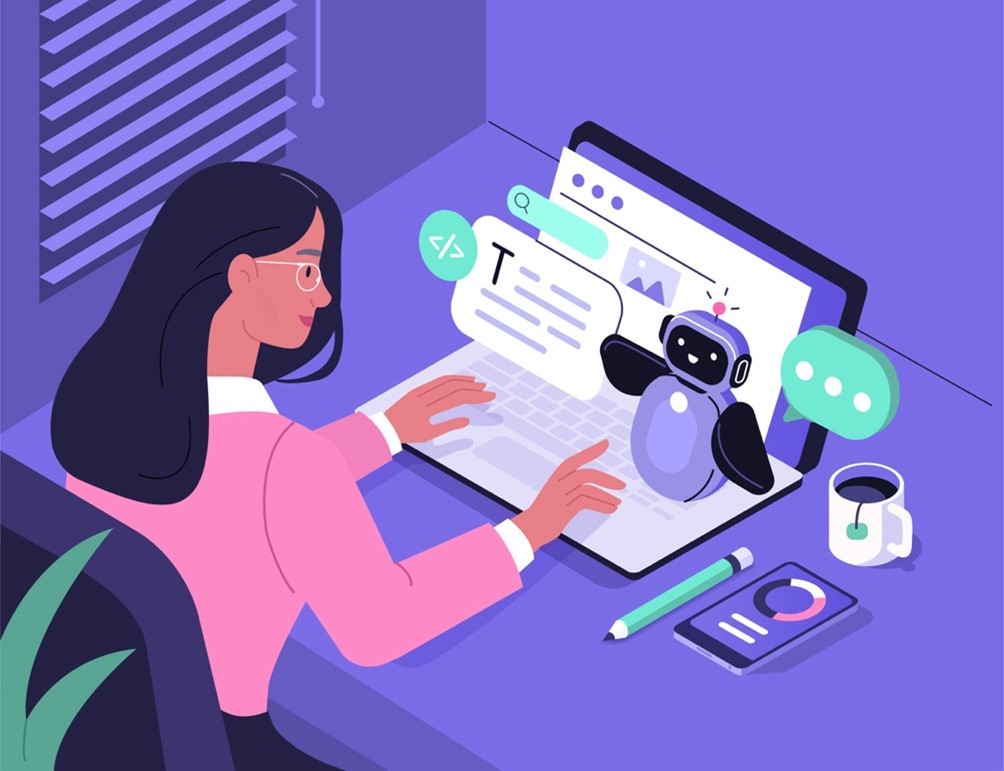Imagine a bustling marketplace set within a futuristic cityscape, where procurement professionals navigate through rows of holographic displays and interactive terminals. Each display showcases a supplier, with detailed profiles floating in mid-air, including capabilities, product quality, delivery timelines, and sustainability practices. The professionals, equipped with tablets, input their detailed requirements into a centralized, AI-driven system—represented by an intricate, glowing orb at the market’s heart. As they enter their needs, the orb pulses with light, sending streams of data towards the displays. Instantly, the marketplace transforms, aligning with their specific needs. Only the suppliers capable of meeting the exact requirements remain highlighted, their profiles shining brighter, while others fade into the background. This visualization illustrates how advanced technologies can be used to streamline the supplier selection process, making it more efficient and effective by directly matching procurement professionals’ needs with the best-suited suppliers.

While Artificial Intelligence (AI) is not yet capable of performing the above scenario, it’s getting close. The year 2023 marked a significant milestone in the journey of integrating AI into procurement, with ChatGPT leading the way. We need to envision using this new technology as similar to hiring an exceptionally knowledgeable and agile assistant to help us with procurement.
As the landscape of procurement continues to evolve, the potential for improved efficiency, improved supplier relationships, and strategic decision-making is immense. As school administrators embrace these advancements, and by strategically joining ChatGPT’s capabilities with human expertise, educational institutions can streamline the complexities of procurement with greater efficiency and success, paving the way for a future where AI and human resourcefulness work hand in hand for operational excellence.
To date, AI has made a significant impact on procurement practices in several key areas. Here are the 6 areas in which ChatGPT and similar AI technologies are expected to further evolve and affect procurement practices in educational institutions in 2024 and the years to follow:
1. Streamlining Supplier Discovery
The task of discovering and screening new suppliers is fundamental to the procurement process. ChatGPT can make this task easier by using its advanced analytics to sift through extensive supplier data, pinpointing potential partners based on specific criteria such as industry relevance, geographical location, and the range of products or services offered. By inputting detailed requirements into ChatGPT, procurement professionals can receive carefully organized lists of suppliers capable of fulfilling their specific needs, and improve the efficiency and effectiveness of the supplier selection process.
Predictions indicate that ChatGPT’s algorithms will offer an even more sophisticated analysis of supplier data. This development will enable procurement professionals to not only identify potential suppliers with greater accuracy but also allow for a smoother onboarding process. By using AI to analyze supplier reputation, sustainability practices, and compliance with industry standards, ChatGPT will provide a comprehensive overview that can help in making informed decisions, and make sure that only the most reliable and aligned suppliers are integrated into the school district’s procurement strategy.

2. Simplifying Contract Management
Contract management is a vital component that influences the success of the procurement process. ChatGPT can help procurement teams navigate the complexities of contracts by analyzing communication exchanges and suggesting optimal contract proposals. This AI-driven approach ensures that all contractual terms and conditions are meticulously reviewed and managed, safeguarding the interests of educational institutions while encouraging transparent and beneficial relationships with suppliers.
The complexities of contract management will continue to demand noteworthy attention and resources. New advances in AI will introduce enhanced features that automate and streamline contract negotiations, management, and compliance monitoring. This will include the ability to understand and interpret complex legal jargon, suggesting adjustments and improvements to contract terms to protect the interests of educational institutions while encouraging fair, ethical, and productive supplier relationships.
3. Monitoring Supplier Performance
Guaranteeing that suppliers meet their contractual obligations in terms of quality, delivery, and service is essential. ChatGPT can assist in monitoring supplier performance by analyzing key data points and issuing real-time alerts concerning any discrepancies or issues. This proactive approach allows for timely interventions, ensuring that supplier performance aligns with the institution’s standards and expectations.
ChatGPT now offers real-time monitoring of supplier performance through advanced analytics and machine learning models. This functionality not only tracks delivery timelines, product quality, and service levels but also predicts potential disruptions, allowing procurement teams to proactively manage risks. By providing actionable insights, ChatGPT can enable school districts to maintain high standards of efficiency and reliability in their procurement processes.
4. Conducting Thorough Market Analysis
In an ever-changing market, having access to timely and accurate analysis is invaluable. ChatGPT allows for comprehensive market analysis by examining current trends, opportunities, and potential risks. This capability permits procurement professionals to make informed decisions, strategically positioning their institutions to capitalize on market opportunities while mitigating risks.
The capability of ChatGPT to conduct market analysis will continue to substantially improve its predictive analytics. In 2024, it promises to not only assess current market trends and risks but also future market dynamics, making it possible for procurement professionals to plan effectively. This projecting insight will support navigating market instabilities and making sure that purchasing decisions are both strategic and informed.
5. Facilitating Quotation Requests
Purchasing products or services requires effective communication with suppliers, especially when requesting quotes. ChatGPT can simplify this process by generating customized email templates for quotation requests. This not only saves time but also ensures that all communications are clear, professional, and aligned with the institution’s procurement policies.
Requesting quotes and managing procurement-related communications will soon be more streamlined, thanks to ChatGPT’s improving natural language processing capabilities. Customizable templates and automated communication workflows will ensure that interactions with suppliers are efficient, clear, and consistent, thus minimizing misunderstandings and speeding up the procurement process.

6. Providing Answers to Procurement Questions
The vast array of regulations, terms, and procedures in procurement can be daunting. AI can serve as a knowledgeable resource, offering explanations and answers to a wide range of procurement-related questions. This access to information enables procurement teams to navigate the complexities of their roles with greater confidence and efficiency.
ChatGPT’s knowledge base on procurement-related questions will continue to expand significantly and will encompass a broader range of topics, including the latest regulations, sustainability practices, and technological advancements in procurement. This readily accessible wealth of information will empower procurement teams to stay informed and compliant and strengthen the decision-making processes.
Recognizing Limitations and Ensuring Balanced Implementation
While ChatGPT and similar AI technologies signal a new era of procurement management, it is important to acknowledge its limitations and approach its integration with a critical eye. The limitations of AI, such as the absence of human empathy, occasional inaccuracies, and the lack of complete training highlight the importance of a balanced approach that combines AI capabilities with human oversight. This ensures that while the technological advantages of ChatGPT are fully used by school administrators, the unique insights and judgments that only human professionals can provide are not overshadowed, and that we maintain the human touch necessary for nuanced decision-making.
Conclusion
As school administrators look towards the future, incorporating AI technology into procurement strategies offers a pathway to improved efficiency, better supplier relationships, and strategic market positioning. By acknowledging its limitations and using its strengths, educational institutions can harness the power of AI to navigate the complexities of procurement in the digital age.
This article is based, in part, on the following articles:
- https://www.mckinsey.com/capabilities/operations/our-insights/operations-blog/making-the-leap-with-generative-ai-in-procurement
- https://www.mckinsey.com/capabilities/operations/our-insights/with-artificial-intelligence-find-new-suppliers-in-days-not-months
- https://www.mckinsey.com/~/media/mckinsey/industries/metals%20and%20mining/our%20insights/succeeding%20in%20the%20ai%20supply%20chain%20revolution/succeeding-in-the-ai-supply-chain-revolution.pdf
- https://wuyuansheng.com/doc/Databricks-AI-Powered-Org__Article-Licensing-July21-1.pdf
- https://www.techtarget.com/searcherp/definition/supply-chain-transformation








